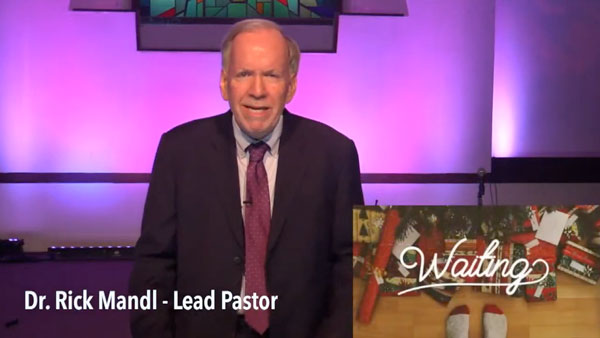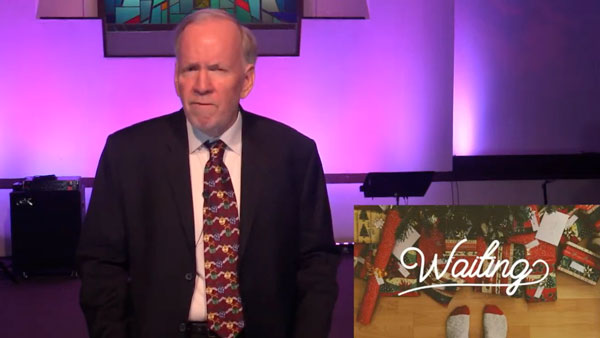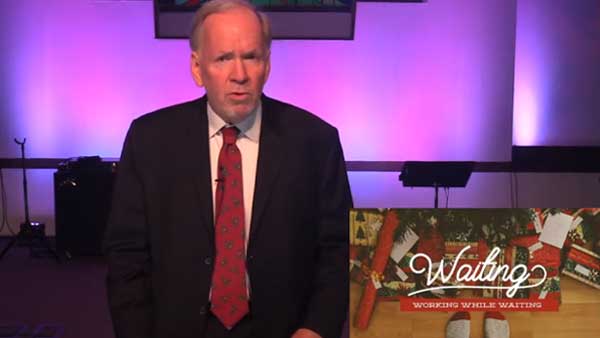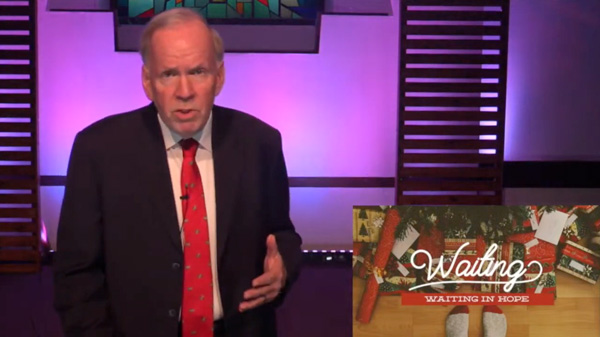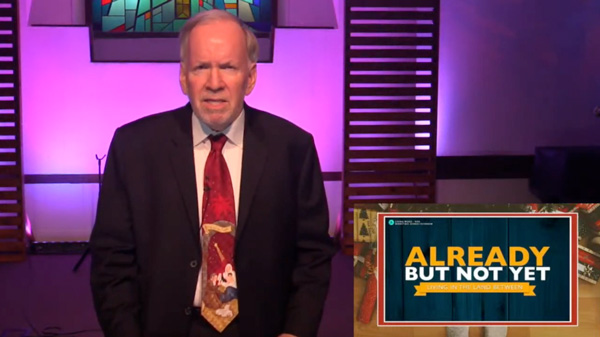Dr. Rick Mandl - December 5, 2020
Growing While Waiting
Sermon Manuscript: Waiting, Message 2- Growing While Waiting
Sermon preached by Dr. Rick Mandl, Eagle Rock Baptist Church, December 5 & 6, 2020
Recorded in Los Angeles, CA.
Hey church family, during these weeks leading up to Christmas, this period of time that we call Advent, it’s a time of waiting. We’re waiting for Christmas and, as we saw last week, as we do that we are simultaneously remembering that first coming of Christ, and we are also looking forward to His second coming. We ended last week with this quote from John Ortberg, Biblically, waiting is not just something we have to do until we get what we want. Waiting is part of the process of becoming what God wants us to be. This time of waiting is not passive. It is a time of becoming. It ought to be a time of growth. So today we are going to look at Growing While Waiting. We’ll look at some of the practices that will help us to grow, but first we need to examine this basic premise: And that is that . . . There is an expectation for growth in those who are followers of Jesus.
Our MEMORY VERSE this week is taken from 2 Peter 3:18, it says, “...grow in the grace and knowledge of our Lord and Savior Jesus Christ.” For the Christian, growth is expected. This is a message that you’ll see repeated throughout the the New Testament. One of the clearest examples would be in Hebrews chapter 5. There, the author is speaking about Jesus as our perfect high priest, and in the midst of his teaching he pauses to reprimand the people he is writing to. You’ll see that he pulls no punches in what he says.
Beginning in Hebrews 5:11 he says, “There is much more we would like to say about this, but it is difficult to explain, especially since you are spiritually dull and don’t seem to listen. You have been believers so long now that you ought to be teaching others. Instead, you need someone to teach you again the basic things about God’s word. You are like babies who need milk and cannot eat solid food. 13 For someone who lives on milk is still an infant and doesn’t know how to do what is right. 14 Solid food is for those who are mature, who through training have the skill to recognize the difference between right and wrong."
The writer is there pointing out that these people he is writing to, have been believers long enough to be able to deal with some of the meatier subjects in the faith. In fact, they’ve been followers of Jesus long enough to be teaching others, but instead, they need to be taught the basics once again. They have the element of time on their side, but the passage of time is not enough for spiritual growth. Growth requires intentionality, it requires practice, it requires discipline, it requires training. And Paul tells us that this training is part of the purpose of the church.
Look at these verses from Ephesians 4. "Now these are the gifts Christ gave to the church: the apostles, the prophets, the evangelists, and the pastors and teachers. Their responsibility is to equip God’s people to do his work and build up the church, the body of Christ. This will continue until we all come to such unity in our faith and knowledge of God’s Son that we will be mature in the Lord, measuring up to the full and complete standard of Christ. Then we will no longer be immature like children. We won’t be tossed and blown about by every wind of new teaching. We will not be influenced when people try to trick us with lies so clever they sound like the truth. Instead, we will speak the truth in love, growing in every way more and more like Christ, who is the head of his body, the church. He makes the whole body fit together perfectly. As each part does its own special work, it helps the other parts grow, so that the whole body is healthy and growing and full of love."
God has gifted people in the church so that we can be equipped to do the work of God. When that equipping and building up is taking place, believers will be maturing in the Lord. We will grow in Christlikeness. As we grow, we help others to grow. This causes us to be spiritually healthy, not only as individuals, but also as a body of believers. So, again. . . As Christians, God’s expectation for us is that we will be growing in our faith. Let’s look at some ways we do that.
The first way we grow in our faith is . . .
- By engaging with God’s Word
2 Timothy 3:16-17 in the Passion Translation says, "Every Scripture has been written by the Holy Spirit, the breath of God. It will empower you by its instruction and correction, giving you the strength to take the right direction and lead you deeper into the path of godliness. 17 Then you will be God’s servant, fully mature and perfectly prepared to fulfill any assignment God gives you" (The Passion Translation). The Bible was given so that we could grow in our knowledge of God and His will for us. But owning a Bible is not enough. We have to get into it. We do this by reading it, by memorizing it, by meditating on it, and by putting it into practice.
This was Jesus’ teaching in Matthew 7. “Anyone who listens to my teaching and follows it is wise, like a person who builds a house on solid rock. Though the rain comes in torrents and the floodwaters rise and the winds beat against that house, it won’t collapse because it is built on bedrock. But anyone who hears my teaching and doesn’t obey it is foolish, like a person who builds a house on sand. When the rains and floods come and the winds beat against that house, it will collapse with a mighty crash.”
Hearing and following is wise. Hearing and not obeying is foolish. This might seem simple, elementary even, but ask yourself: How much time do I spend in God’s Word? Do I do more than a cursory skim of the passage? Do I read just so I can check off the box on my to-do list, or do I apply what I read so that my life will be transformed? How much of an impact does the Bible make on my life? Have I seen any growth in my interaction with God’s Word, or am I still at the same place I was when I first came to Christ?
This week in our email devotions, we have begun a series on Advent. While reading a short email by itself isn’t enough for spiritual growth, it is a way to begin to engage with God’s Word. If you would like to receive these emails, please check the box on your connection card, or send me an email this week and I’ll make sure you are added to the distribution list. It is not possible to grow as a Christian without regularly engaging with the Word of God.
We also grow through
- Prayer
Professor M. Robert Mulholland makes this observation, “We tend to think of prayer as something we do, in order to produce the results we believe are needed or, rather, to get God to produce the results...As a result, our prayer tends to be a shopping list of things to be accomplished, an attempt to manipulate the symptoms of our lives without really entering into a deep, vital, transforming relationship with God." I think that is pretty typical of our attitude to prayer. We pray to get God to do something on our behalf, or maybe on the behalf of someone else. But that is not the biblical view of prayer.
The Spiritual Disciplines Handbook describes prayer in this way, "Prayer is a word that describes a relationship. Disciplines of prayer provide patterns for attending to God throughout the day. They open us to the divine dialogue through intentional encounter with the Trinity." Prayer is a word that describes a relationship! That’s why the Bible teaches us to “Never stop praying” (1 Thessalonians 5:17). And to... "Pray in the Spirit at all times and on every occasion. Stay alert and be persistent in your prayers for all believers everywhere" (Ephesians 6:18). It is through this continual attitude of prayer that we communicate with God, and as we communicate with God we get to know Him better, our love for Him deepens, and our heart is conformed to His heart.
I think this is one of the reasons why Jesus commanded us to, “Pray for those who mistreat you” (Luke 6:28). When we pray for someone - we begin to see them through God’s eyes. We see His love for them, and our hearts begin to soften toward them. What may have started out as mere obedience to God’s command to pray, can become an act of love as we recognize our enemy as someone that Jesus loves and died for.
Let’s put it in human terms. Have you ever known a couple who have been married a long time, who finish each other's sentences, and who seem to be able to communicate without words? They didn’t start out that way, but as they spent time together… As they talked to one another and listened to each other, the relationship deepened. They began to see the world through each other’s eyes. People who were precious to one became precious to the other. They became preoccupied with each other’s concerns. That’s what prayer can do for us.
Henri Nouwen describes it this way: "Prayer is the way to both the heart of God and the heart of the world – precisely because they have been joined through the suffering of Jesus Christ... Praying is letting one’s own heart become the place where the tears of God’s children merge and become tears of hope." As we mature in our faith, OUR PRAYERS CHANGE. They become more than just a wish list, like a child might make for Santa Claus, and they move to communion with God. Yes, we are to bring our requests before Him, but we are also to spend time praising Him, thanking Him, confessing to Him, and listening to Him. As we mature, OUR PRAYERS EXPAND. They become less about me and my small world and more about seeing God’s will be done in the world at large.
Again, this may seem to be very basic, but let’s honestly ask ourselves: What is my prayer life like? Are my prayers a grocery list of things I want God to do for me? Do I spend any intentional time in prayer, or are my prayers relegated to saying a few words of thanks before I eat? Do I think of prayer as a privilege, something I get to do? Or do I think of prayer as a chore, something I have to do? Finally, ask yourself, is there ANY difference in my prayers now, than when I first came to Christ? Is this an area where I’ve seen growth? Growth is an expectation in the Christian life.
- We grow by engaging with God’s Word, and
- We grow through communication with God in prayer.
But this growth is not meant to take place in isolation, just as the Christian life is not meant to be lived in isolation.
- We grow by being in community.
God has always existed in community as the Trinity: Father, Son, and Holy Spirit. When Jesus came to earth, He lived in community with His disciples. And as those who have been created in God’s image, we are made for community. Paul teaches on this in Romans 12 where he compares us as believers to a body. "Just as our bodies have many parts and each part has a special function, 5 so it is with Christ’s body. We are many parts of one body, and we all belong to each other." God has put us together, and He has gifted us so that we can minister to one another in the body.
Look at Paul’s words from 1 Corinthians 12 – He writes, "There are different kinds of spiritual gifts, but the same Spirit is the source of them all. There are different kinds of service, but we serve the same Lord. 6 God works in different ways, but it is the same God who does the work in all of us. A spiritual gift is given to each of us so we can help each other." A spiritual gift is given to each of us so we can be sufficient in ourselves. Is that what the text says? No! It says, “A spiritual gift is given to each of us so we can help each other.” We are meant to live in community so that we can help each other.
We are ALSO meant to live in community so that we can empathize with each other. Looking again at 1 Corinthians 12, we’re told. . . If one part suffers, every part suffers with it; if one part is honored, every part rejoices with it. Now you are the body of Christ, and each one of you is a part of it. Paul makes this same point in Romans 12:15 when he says, "Rejoice with those who rejoice, and weep with those who weep." We should be moved by the suffering of our brothers and sisters in Christ, because we are one body.
Finally, we are meant to live in community so that others can see the love we have for one another, and know we are followers of Christ. Look at Jesus’ command to His disciples in John 13 - - He said . . . So now I am giving you a new commandment: Love each other. Just as I have loved you, you should love each other. Your love for one another will prove to the world that you are my disciples.” We cannot love one another unless we live in community. The Apostle John wrote that our love for one another should be demonstrated in very tangible ways – He said, “We know what real love is because Jesus gave up his life for us. So we also ought to give up our lives for our brothers and sisters. If someone has enough money to live well and sees a brother or sister in need but shows no compassion—how can God’s love be in that person?” “Dear children, let’s not merely say that we love each other; let us show the truth by our actions.”
The bottom line is . . . We cannot give up our lives… We cannot see a brother or sister in need if we are not living in community with others. The church at Thessalonica was doing a good job of demonstrating love, and Paul commends them for it – he writes. . . “Now about your love for one another we do not need to write to you, for you yourselves have been taught by God to love each other. And in fact, you do love all of God’s family throughout Macedonia. Yet we urge you, brothers and sisters, to do so more and more” (1 Thessalonians 4:9-10). Don’t miss those last words, “Yet we urge you, brothers and sisters, to do so more and more.” Paul didn’t say, you’re doing a great job loving one another, now just kick back and coast for a while. No, he says, you’re doing a great job loving one another, now keep going, keep growing in your love for one another.
In fact, earlier in this letter, Paul gives the church this benediction: “And may the Lord make your love for one another and for all people grow and overflow, just as our love for you overflows.” God wants our love for others to grow and overflow.mThis is a component of spiritual growth. But how do we live in community with others, especially in this time of isolation due to the pandemic? Well, it requires being intentional.
We can’t just assume we’ll have the opportunity to talk to people as we bump into them in the patio after church. We have to take initiative and contact those God puts on our mind. It requires us pursuing community. This means being part of a Life Group or other small group. It requires us being vulnerable. We have to share the things we’re struggling with, our joys, our sorrows, our fears, our prayer requests. It requires us to be truthful. We have to be willing to say hard things to one another, to encourage one another in our spiritual walk, and to gently correct where there is sin or error. It requires us to pay attention to those around us. Has someone been missing from your life group? Send them a text. Has someone normally been present in the chat box during the service you attend, but you haven’t seen them there in a couple of weeks? Give them a phone call. Has a brother or sister shared a prayer request with you? Follow up with them to see how it’s going.
Community in the time of Covid is a little more difficult, but it is not impossible, and it is essential to our growth as believers. Now, I can hear a few of you saying – “I’m just fine without community.” “I actually prefer to be by myself.” To you I would say, God’s design for us to live in community is not just for our own benefit. Other believers need us to be part of their community. They need us to contribute to their growth, and to bear their burdens, and to hold them accountable. When we refuse to be part of a community of believers, we are depriving others of the gifts God has given to us. We are depriving others of the knowledge and insight that we have, And we are depriving others of the encouragement that we might be to them.
It is God’s plan for us to grow by being in community, whether or not we think we need it. It might not be about what we need, it might be about what someone else needs. We grow by being in community. We’re about a quarter of the way through our Advent season, this time of waiting. Let’s resolve to use this time to mature in our faith. Growth is the expectation for believers, And while our faith is not based on our works but on God’s grace, we need to remember that grace is not anti-effort, and spiritual growth requires effort, it requires being intentional, it requires discipline.
God has given us SPIRITUAL PRACTICES that are catalysts for growth. Practices like… Engaging with the Bible, Communicating with God through prayer, And Living with others in community. Look at what Pastor Craig Dykstra had to say about these spiritual practices: Practices are the nuclear reactors of the Christian faith, arenas where the gospel and human life come together in energizing, even explosive ways. Practices create openings in our lives where the grace, mercy and presence of God may be made known to us. Craig Dykstra It is through these practices that we make room in our lives for God’s Spirit to reveal Himself to us. It is through these practices that we make space to listen and respond to those revelations.
My challenge for each of us over these days while we are waiting for Christmas, is to choose one of the practices we’ve looked at today, and ask the Holy Spirit to help us make a plan for growth in that area. If you want to grow in the area of engaging with scripture, pick one of the shorter epistles to read through multiple times over the next three weeks. Or concentrate on the incarnation story in the first two chapters of Matthew, the first two chapters of Luke, or the first chapter of John. Keep a pen and paper nearby to jot down your thoughts or questions as you read. If you want to grow in the area of prayer, choose a time and a quiet place to communicate with God. Begin by telling Him your desire to mature in this discipline. Memorize some of the Bible verses about prayer. Talk to God in a conversational way, and spend some time quietly listening. What should you be listening for? Perhaps a passage of scripture that God brings to your mind, Perhaps a person that God draws to your attention, Or perhaps an area of your own life that the Holy Spirit convicts you about. If you want to grow in the area of community, take a risk and share your desired area of growth with someone you trust. Ask them to pray for you and to check in with you to see how you are doing. Connect with a member of your life group, follow up on their prayer requests. Send a card, or even a text to someone that God has brought to your mind. Ask how you can be praying for them.
We can spend the next three weeks frantically trying to get everything ready for Christmas. We can spend the next three weeks mourning over the fact that Christmas will be different this year. Or, we can spend the next three weeks intentionally cooperating with the Holy Spirit in the process of becoming who God wants us to be. Author Jim George reminds us of this truth: Spiritual maturity is a lifelong pursuit. We grow in spiritual maturity moment by moment, day by day, year by year. So, let’s not waste this time of waiting. Let’s make it a time of growing. And as we do, let’s remember that spiritual maturity is not a destination, it is a journey, and let’s ask God to help us persevere until that day when the waiting is finally over. Would you pray with me . . .
Reecorded in Los Angeles, CA.
Scripture References: 2 Timothy 3:16-17, Matthew 7:24-27, 1 Thessalonians 5:17, Ephesians 6:18, Luke 6:28, Romans 12:4-5, 1 Corinthians 12:4-7, 1 Corinthians 12:26-27, Romans 12:15, 1 Thessalonians 4:9-10, 2 Peter 3:18
From Series: "Waiting"
2,000 years ago the people of Israel were weary of waiting for their Savior. Because of this, most were caught off guard when he was born in a stable. Like them, we often give up on our prayers believing nothing is going to happen. Just when we are aren’t looking for God, he often shows up and intervenes in surprising ways. In this Advent series, we will look at what it is we’re waiting for and what we should do while we wait.
